Nowadays, APIs (Application Programming Interface) are required to interact with almost any application. You may ask, “Why”? Well, it’s because APIs are a great way to securely and selectively transfer data to a third party.
By selectively, I mean you don’t need to expose all of your data to the requesting party. You can abstract some of it and share only what you want to.
But there’s a catch. For significantly complex applications, the API can become cumbersome and tedious to deal with. With over 100+ endpoints, API users may find it difficult to access data in a structured way.
To overcome this type of scenario, SDKs are used to package everything related to the API and to make the API simpler to use. An SDK is nothing but a software development kit that contains API endpoints, documentation, and a lot of abstractions to call various endpoints.
You can create an SDK for multiple programming languages, depending on your customer base and which languages they work with.
Speakeasy
Speakeasy is an API infrastructure platform where you can improve your APIs using artificial intelligence and by generating SDKs. It provides a fully customizable SDK generation tooling with support for multiple programming languages, including Go, Python, Java, and Typescript.
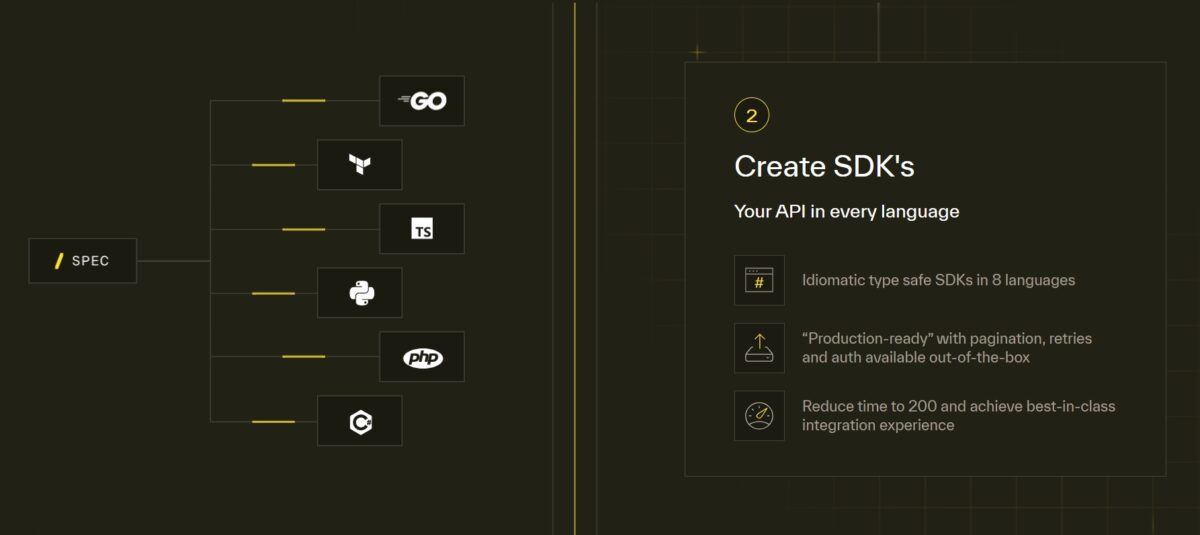
The SDK generated by Speakeasy focuses on these key aspects to improve the developer experience.
Key Features:
- Fully-Typed
- OpenAPI Support
- Helpers and Batteries Included
- Easy to Use
It also helps you create terraform providers to level up your API infrastructure. Not only that, generating inline documentation works like a charm using Speakeasy and is consistent with the API spec.
They provide a free tier for hobby and personal projects and an enterprise plan for businesses.
Apimatic
It’s a platform that helps to improve the API developer experience by providing an API portal, code-gen as a service, and an API transformer. Apimatic uses its core engine to break down API into four basic components:
- Transformer: Helps in specs and validation
- Designer: For spec merging and portal editing
- Code Generator: Generate client libraries, code samples, and publish packages
- Docs Generator: Generate docs from specs with input validation
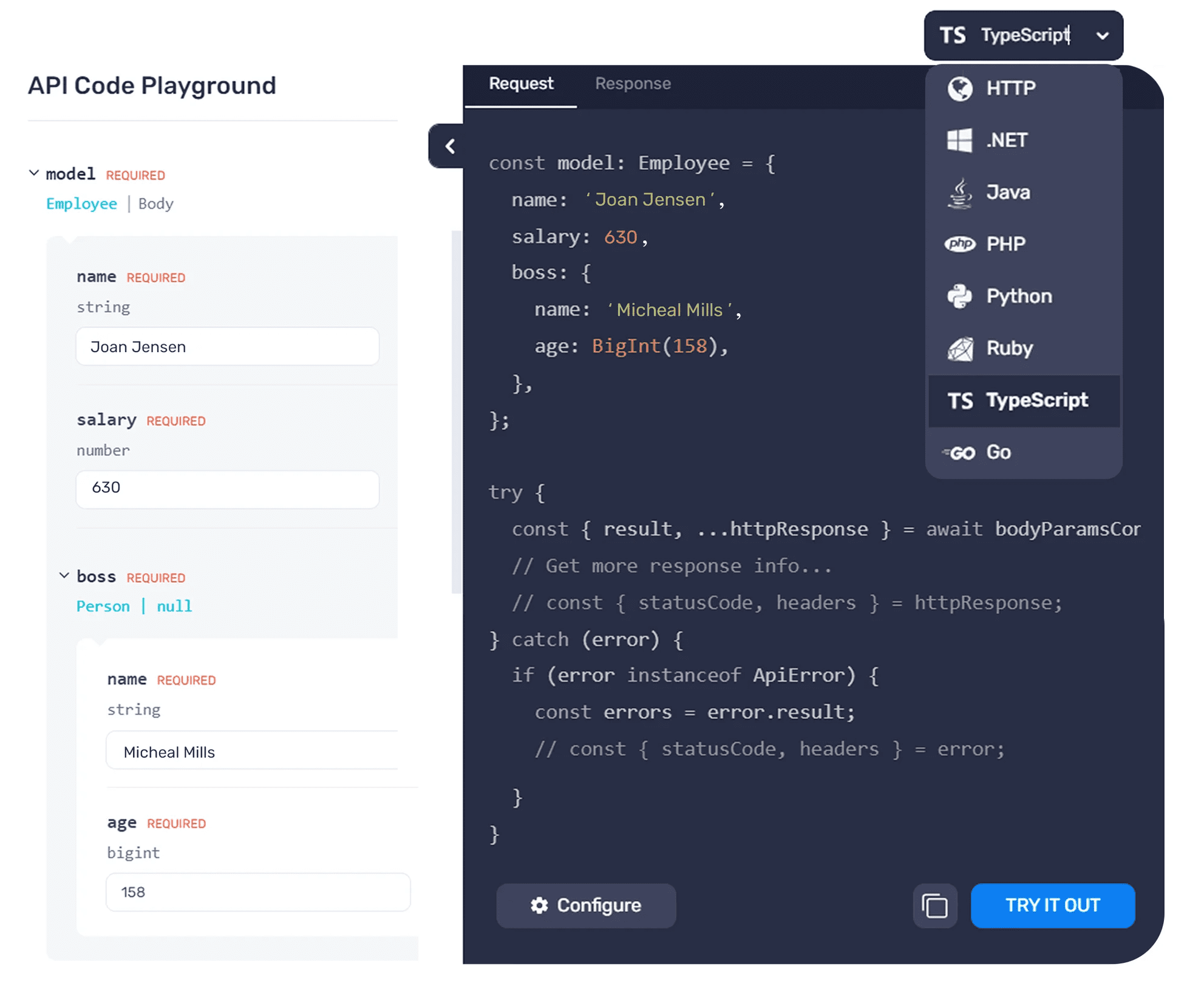
These four components are then combined into a desired solution for your API.
It offers a 14-day free trial but does not include a free tier. For businesses and enterprises, it follows a custom pricing model.
Fern
Fern is specifically designed to generate SDK for your API. It’s an alternative to OpenAPI spec, but you can import OpenAPI spec if you already have one. The SDKs generated by Fern are idiomatic, i.e., they utilize language-specific features, and it feels like they are handwritten.
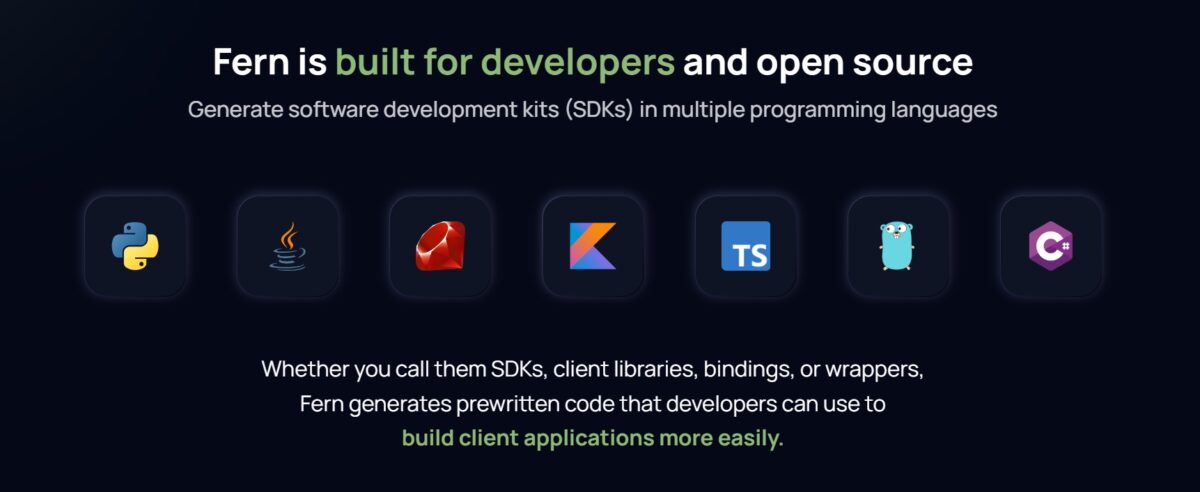
SDKs are customizable, which allows you to add custom logic to them. Also, it automatically generates networking logic and type definitions so that you can focus only on the business logic.
Fern offers a free tier in which you can add up to 3 users and utilize all generators. With the pro plan, you can publish SDKs to GitHub repos and sync to Postman.
Liblab
Liblab is a language-native, SoC-2-compliant SDK generator with built-in authentication, error handling, and security. You can get almost all the features that are present in other API SDK generators.
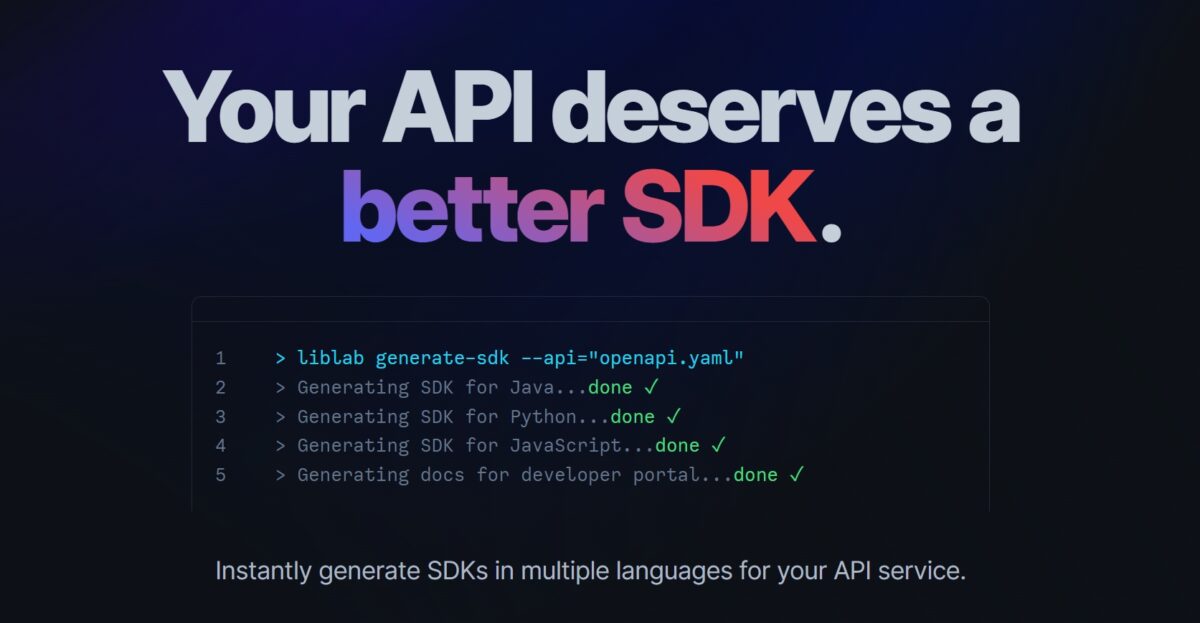
Hooks are used to inject custom code into your SDK generation pipeline. Liblab provides an entire framework known as Hooks Framework to do so.
Not only that, you can also use GitHub Actions to trigger automatic SDK plus docs generation whenever you commit something to your GitHub repository.
It’s free for personal and hobby projects allowing you to explore Liblab. The Pro version comes with some advanced features, such as custom domains, analytics, security alerts, and usage insights.
Konfig
Konfig can regenerate the SDK whenever you make a change to your API spec. An SDK generation tool allowing you to import OpenAPI spec or Postman collection to automatically generate as well as publish SDKs.
It supports all major languages, including Java, Typescript, Python, Go, C#, Ruby, etc. Writing test cases and input validation is not a thing for you to worry about.
You can schedule a demo to start exploring it.
Appwrite
Appwrite‘s SDK generator is a PHP library for generating SDKs in multiple programming languages Typescript, Nodejs, Java, Kotlin, Go, Dart, Python, etc. However, currently, it only supports Swagger 2.0 spec at the time of writing this article. The list of all specs that will be supported in the future is listed under this README file.
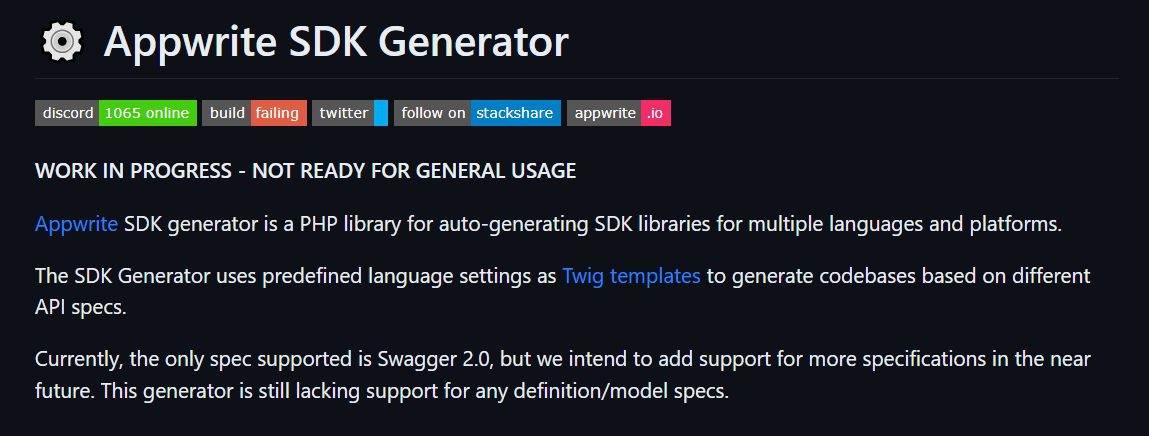
Another important thing to note is it’s still a work in progress for this SDK generator, so I would not recommend using it in production. And there is still no support for major specifications such as Postman.
REST United
REST United is an SDK generator to generates SDKs in 9 different programming languages. You can generate an SDK in just five steps:
- Define the endpoint
- Define the request
- Define the response
- Validations & Testing
- Release SDK
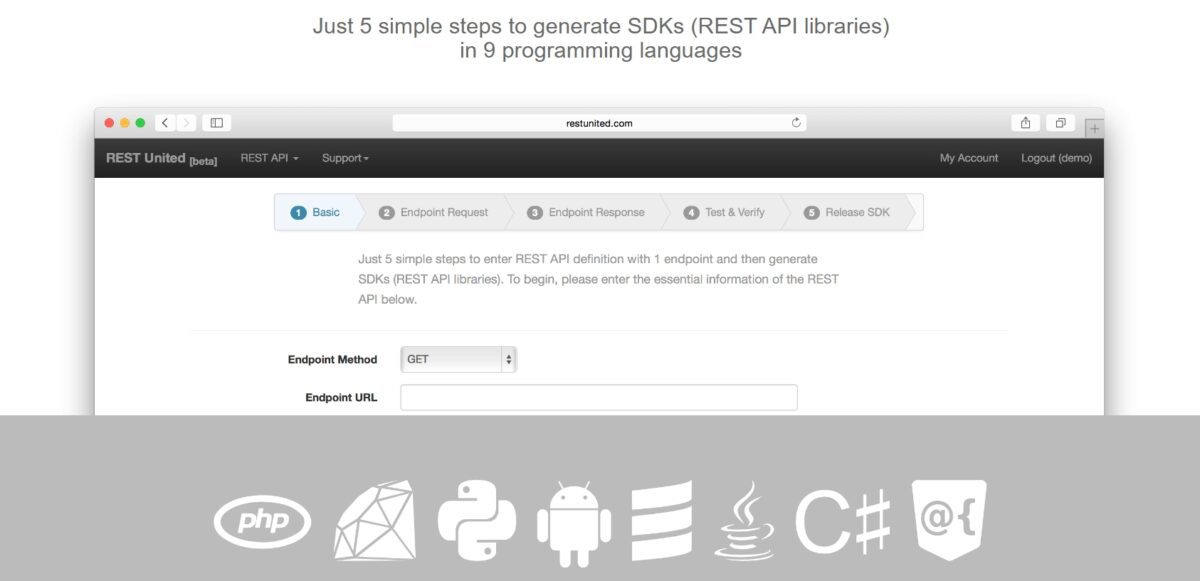
Supported programming languages include PHP, Ruby, C#, Scala, Android, Objective-C, Java, Python, and ActionScript (Flash). The documentation is also customizable as per your needs.
It offers a 14-day free trial for you to explore the generator with up to 5 endpoints per API. The enterprise plan is based on a custom pricing model.
Swagger Codegen
Swagger Codegen is an open-source tool to generate client SDKs for APIs defined with the OpenAPI specification. API definition files can be used to create libraries in popular languages like Java, Scala, and Ruby. It supports over 40 programming languages and can also generate server boilerplate code for up to 20 programming languages.

With its free tier of Swagger Hub, you can use the API editor, host docs, and mock API. Its enterprise plan allows a minimum of 15 designers and 30 consumers.
Kiota
Kiota is an open-source command line tool for generating an API client library to call any OpenAPI specification-based API. Its API SDK provides a strongly typed experience with all the features from a high-quality SDK, but without you having to learn a new client library for every API.
It supports various programming languages such as C#, Go, Python, Java, PHP, Python, Swift, Typescript, etc. Kiota can generate code that enables autocomplete in your IDE to help in API resource and method discovery. Also, it enables full access to HTTP capabilities.
Reasons to Create an SDK for your API
Below are some of the reasons why you may need an SDK for your API.
#1. Makes it easier to use API
Imagine having 10 different endpoints that will be called from a specific component in the user interface. Will it not be tedious for those writing code to call different endpoints? Yes, it will, but with an SDK, you can create a function that implements that functionality right out of the box for the API users.
// sdk
import { fetchUsersWithAccess } from "sdk";
const usersWithAccess = fetchUsersWithAccess(id);#2. Best Practices by Default
You don’t want your customers to use the API with bad practices. So, with an SDK, you can implement certain secure functions that the users can use safely without worrying about the implementation.
#3. Better Error Handling
Error messages are essential when a new developer team is using your API. If they do something unexpected, they should be able to find the root cause. And SDKs can help you generate better and more comprehensive error messages.
#4. Abstract HTTP Client
In order to make an API call, you need to implement an HTTP request handler. And if you don’t want users to deal with HTTP request handling by themselves, you can abstract all of that with an SDK. The SDK implementation can take care of the HTTP version, headers, timeouts, etc.
#5. Enforce Proper Validations
SDK can be used to enforce validations, for example, mandatory function parameters and their data types. This is important in order to ensure API users don’t input incorrect information and they don’t have to add validations on their own.
Final Words
SDK generation tools for APIs are essential because they make the developer experience so much better for teams that are using your API. This eventually leads to more customers because they find your API easy to use. When picking an SDK generation tool, look out for language support as well as API specification support.
Interested in AR/VR? Check out the best-augmented reality SDKs to build creative apps!
-
 EditorNarendra Mohan Mittal is a senior editor & writer at Geekflare. He is an experienced content manager with extensive experience in digital branding strategies.
EditorNarendra Mohan Mittal is a senior editor & writer at Geekflare. He is an experienced content manager with extensive experience in digital branding strategies.


